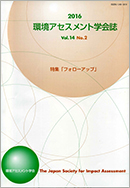Volume 14, Issue 2
Displaying 1-11 of 11 articles from this issue
- |<
- <
- 1
- >
- >|
Seminar Report
-
2016Volume 14Issue 2 Pages 3-12
Published: August 20, 2016
Released on J-STAGE: May 02, 2017
Download PDF (842K) -
2016Volume 14Issue 2 Pages 13-17
Published: August 20, 2016
Released on J-STAGE: May 02, 2017
Download PDF (769K) -
2016Volume 14Issue 2 Pages 18-23
Published: August 20, 2016
Released on J-STAGE: May 02, 2017
Download PDF (1415K) -
2016Volume 14Issue 2 Pages 24-32
Published: August 20, 2016
Released on J-STAGE: May 02, 2017
Download PDF (1471K)
Feature Articles
-
2016Volume 14Issue 2 Pages 33-39
Published: August 20, 2016
Released on J-STAGE: May 02, 2017
Download PDF (951K) -
2016Volume 14Issue 2 Pages 40-44
Published: August 20, 2016
Released on J-STAGE: May 02, 2017
Download PDF (827K) -
2016Volume 14Issue 2 Pages 45-50
Published: August 20, 2016
Released on J-STAGE: May 02, 2017
Download PDF (941K)
Original Paper
-
2016Volume 14Issue 2 Pages 51-61
Published: August 20, 2016
Released on J-STAGE: May 02, 2017
Download PDF (599K) -
2016Volume 14Issue 2 Pages 62-68
Published: August 20, 2016
Released on J-STAGE: May 02, 2017
Download PDF (1069K)
Internal and External Trends
-
2016Volume 14Issue 2 Pages 69-74
Published: August 20, 2016
Released on J-STAGE: May 02, 2017
Download PDF (2140K) -
2016Volume 14Issue 2 Pages 75-76
Published: August 20, 2016
Released on J-STAGE: May 02, 2017
Download PDF (1100K)
- |<
- <
- 1
- >
- >|
